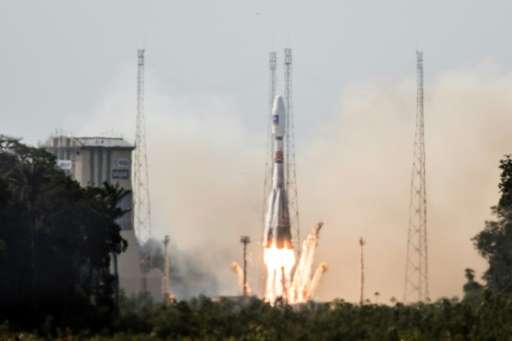Europe ready for next Galileo satnav launch

Europe is poised for the launch on Friday of the next two satellites in its troubled multi-billion-euro Galileo satnav programme.
The project—a rival to America's GPS for navigation and search-and-rescue services—will ultimately consist of a constellation of 30 orbiters, including six spares, but it has been plagued by delays, technical glitches and budget questions.
Satellites nine and 10 are meant to blast off from Europe's spaceport in Kourou, French Guyana at 0208 GMT Friday, which will be late Thursday local time.
If everything goes according to plan, a third of the much-trumpeted system will be in place.
"We are very confident," Galileo programme director Didier Faivre of the European Space Agency (ESA) told AFP on Wednesday. "All the inspections went very well."
The launch of orbiters seven and eight in March was about three months late to allow for a probe into an August 2014 mishap that sent satellites five and six into a lopsided, elliptical orbit.
The pair have since been manoeuvred into a better, more circular path, and will become operational with the rest of the group in space by year-end.
"They will still be in a strange orbit, but for the (system's) users that won't make any difference," said Faivre.
The August 2014 mishap was blamed on frozen fuel pipes on board the Soyuz rocket's fourth stage, called Fregat—a problem ESA says has since been fixed.
'The most difficult'
The launch of satellites five and six, meant to have been the first fully operational Galileo orbiters, had itself been delayed by more than a year due to "technical difficulties". The first four orbiters were launched in 2011 and 2012.
Two more are scheduled for launch by year's end, and ESA hopes to launch six orbiters per year from 2016.
"We are very confident about the pace of deployment," said Faivre. "We have done a third of the work, but it was the most difficult third."
The European Commission, which finances the project, aims to have 16 satellites in orbit by the end of 2016 to start providing initial satnav service including applications for smartphones, in-car navigation and search-and-rescue location.
The remaining satellites will be launched using a combination of Soyuz rockets, which can take two aloft at a time, and by Europe's own Ariane 5 ES launcher, which is being adapted to handle four.
"The way things are going we can expect the first Galileo launch with Ariane 5 ES in the second half of 2016," said Stephane Israel, CEO of launch company Arianespace.
Five billion euros ($5.5 billion) were spent on Galileo up to 2014, and a budget of another seven billion euros has been approved until 2020.
The satellites themselves are valued at about 40 million euros each, and each launch with a Soyuz costs an estimated 65-70 million euros.
© 2015 AFP





















